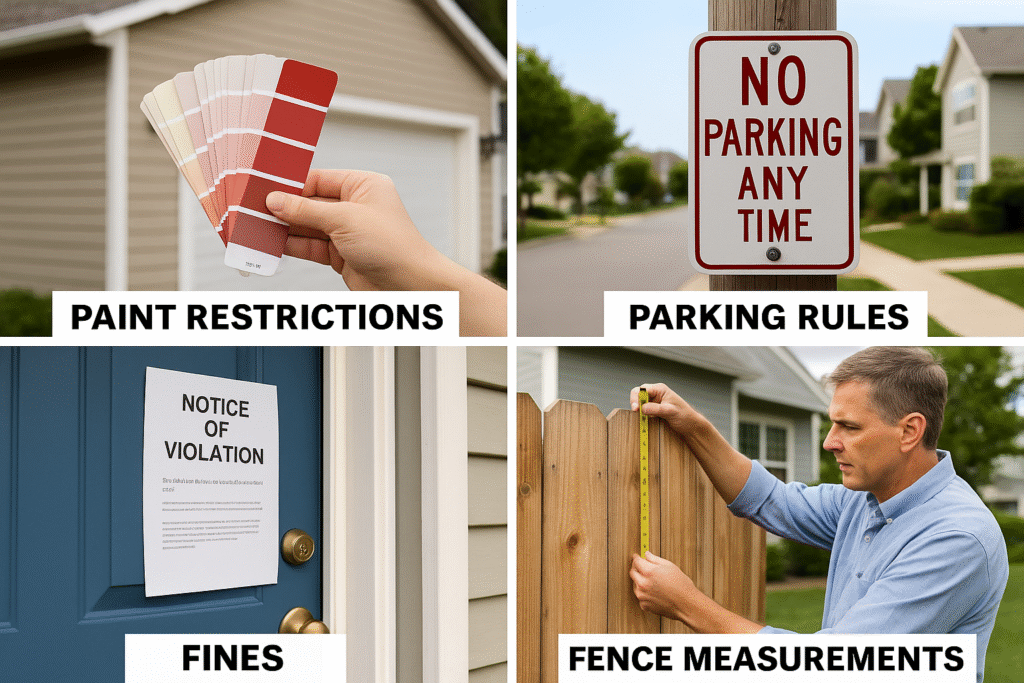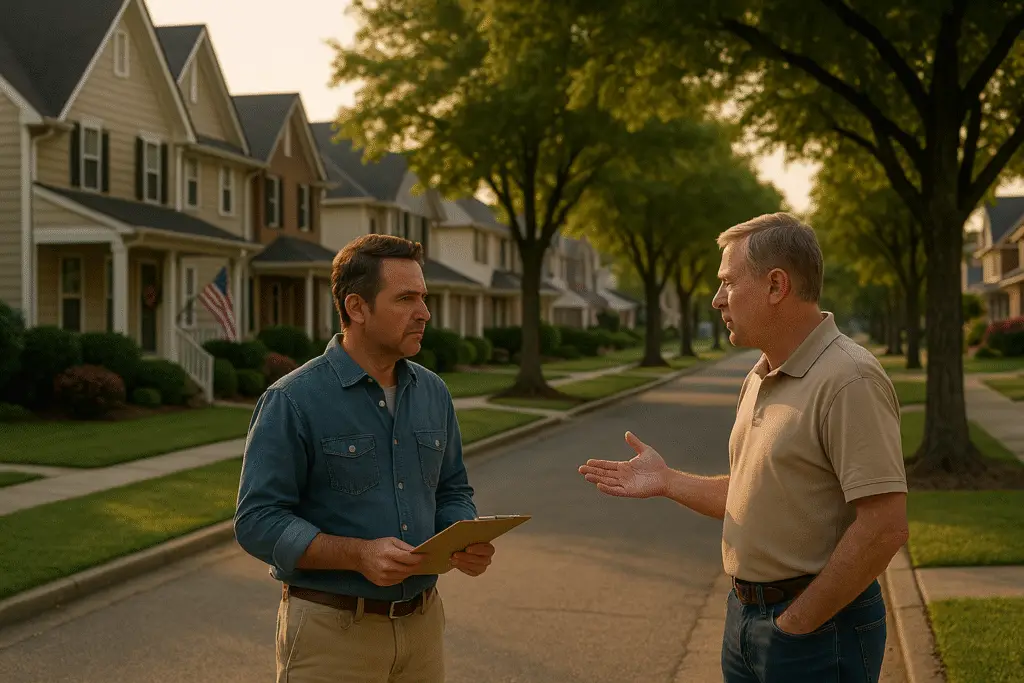Homeowners associations (HOAs) can be a blessing and a curse. They keep your neighborhood looking tidy, enforce community standards, and may even boost your property value. But what happens when that same HOA becomes more of a headache than a help?
Whether it’s a disagreement over lawn decor or a surprise fine in your mailbox, HOA disputes can quickly get personal and costly. The good news? Most problems can be resolved without going nuclear. You just need to know your rights, your responsibilities, and how to play your cards wisely.
Where HOAs Came From — And Why They’re a Mixed Bag
HOAs began rising in popularity in the 1960s and 70s, especially in suburban developments. Developers preferred HOAs because they allowed for private management of shared spaces and services, helping to maintain property values while reducing reliance on municipal resources. Developers preferred HOAs because they allowed them to manage community maintenance and amenities privately, reducing the need for local government services and making neighborhoods more marketable.
When HOAs work well, they keep things running smoothly: clean streets, shared amenities, and rules that prevent your neighbor from painting their house neon green. But when they don’t? You might face unclear guidelines, selective enforcement, or even overreach.
What Causes Most HOA Disputes?
Disagreements between homeowners and HOAs usually fall into a few predictable categories:

- Uneven or unclear rule enforcement: Some homeowners get fined for things others get away with.
- Architectural restrictions: Disputes over paint colors, fences, additions, solar panels, or landscaping changes.
- Fines and fees: Surprise charges, late fees, or special assessments can feel arbitrary or excessive. For example, one homeowner received a $150 fine for not edging their lawn to the HOA’s standard after a single warning.
- Parking and vehicle issues: Rules about overnight parking, guest vehicles, or RV storage can get contentious fast.
- Poor communication: Vague newsletters, unanswered emails, and closed-door board decisions fuel frustration.
Sometimes, it’s not the rule that causes the dispute—it’s how the rule is explained or enforced. That’s why knowing your HOA’s governing documents is your first move.
Know Your HOA Rules Inside and Out

Every HOA is governed by a set of documents: the Covenants, Conditions & Restrictions (CC&Rs), bylaws, and rules and regulations. These are your playbook. They spell out what the HOA can and can’t do, what they expect from homeowners, and how disputes are supposed to be resolved.
If you don’t have a copy, ask your HOA board or management company for one. Focus on:
- Maintenance responsibilities
- Fine schedules
- Architectural review procedures
- Dispute resolution policies
Pro Tip: If the CC&Rs read like legalese, try summarizing each section in your own words. You’ll understand it better and catch more details.
Raising Concerns Without Raising Tension
If something doesn’t sit right, don’t let it fester. Start by gathering facts. Take photos, document correspondence, and reference the relevant rule or section in the CC&Rs. Then, try a respectful conversation—email or in person.
Let’s be honest—sometimes, it’s not really about the mailbox. Personality clashes, past tension, or a poorly worded email can turn a small rule into a major rift. That’s why calm, respectful tone matters just as much as the facts.
Try to connect with your HOA board as neighbors first, not adversaries. Most HOA board members are homeowners themselves, volunteering their time to serve the community. A calm, friendly tone goes a long way in preventing an “us vs. them” dynamic. One of the best ways to lower the temperature in a tense conversation? Let the other person know you’re really listening. Try saying, “So if I’m hearing you right, the concern is about…” It shows respect and opens the door to compromise.
Sometimes, a calm email gets results faster than a fiery letter ever could.
If informal conversation doesn’t resolve the issue, escalate with a written complaint. Keep it clear and professional. Avoid accusations or emotional language. Just the facts. Stay solution-focused. Instead of just pointing out a problem, suggest a fair resolution. For instance, if your fence height slightly exceeds the limit, offer to trim it to a compromise height. It shows you’re acting in good faith.
And if you feel stuck, ask why a rule exists instead of just fighting what it says. Understanding the reason behind it can lead to compromises that work for both sides.
Watch Out: Venting on Facebook or Nextdoor might feel good in the moment, but it can backfire. Many HOAs monitor social media, and public posts can complicate resolution.
What If You Feel Targeted or Retaliated Against?
Sometimes a dispute can feel personal—like you’re being singled out, harassed, or punished for speaking up. If you suspect retaliation (such as suddenly getting fines after attending a board meeting or challenging a decision), don’t ignore it.
Start by documenting everything: dates, communications, photos, and witnesses if possible. Keep your communication professional and on record. Mention concerns factually, without accusing anyone of bad intent.
AHA Guidance: Retaliation by an HOA may violate your state’s housing or homeowner protection laws. Some states explicitly ban HOAs from penalizing homeowners for exercising their rights—like attending meetings or disputing rules in good faith. If the pattern continues, it may be time to contact a legal expert or your state’s HOA ombudsman.
Mediation vs. Legal Action: What Are Your Options?

If direct communication fails, check your HOA documents for a formal dispute resolution process. Many HOAs are required to offer mediation or arbitration before things head to court.
Mediation is typically faster and cheaper than suing. It also leaves the door open for neighborly relationships to heal. Legal action should be your last resort—but don’t be afraid to go there if your rights are being violated.
AHA Guidance: Before hiring a lawyer, see if your state has a homeowner advocacy group or ombudsman that handles HOA issues. They can help interpret your rights and even intervene.
State-specific laws also matter. Some states (like California and Florida) have detailed laws governing how HOAs must operate. If you’re unsure, consult a real estate attorney familiar with HOA law in your state.
No one buys a home hoping to argue over mailbox height—but a few habits now can save a lot of heartburn later.
How to Avoid Future Disputes
Even if your HOA seems reasonable now, it’s worth setting up habits that prevent issues down the road:
- Attending HOA meetings
- Asking questions before starting a project
- Reviewing board decisions or meeting minutes
- Building rapport with board members or neighbors
AHA Insight: When possible, get approvals in writing—even for informal okay’s. It prevents future “he said, she said” scenarios.
Consider volunteering on a committee or attending a few meetings even when you don’t have a complaint. It builds mutual respect and makes you a familiar face, not just a name on a letter.
Sometimes a quick win helps build momentum. If your main request isn’t landing well, start by proposing something smaller everyone can agree on. It builds goodwill and can lead to bigger breakthroughs.
And if tensions run high, don’t be afraid to press pause. Taking a few days to let things cool off can give you (and the board) time to think more clearly.
Being involved doesn’t just help you stay informed—it gives you a voice.
Conclusion: Stand Your Ground, But Stay Smart
HOAs aren’t always the villains they’re made out to be. Knowing your HOA’s rules and how to engage constructively is often the difference between a quick fix and a drawn-out battle. Often, disputes come down to poor communication or misunderstanding the rules. The smartest thing you can do? Stay informed, stay calm, and stand up for what’s fair.
Remember, knowing your HOA rules is more than a defense tactic—it’s your best tool for protecting your home and your peace of mind. When you approach issues thoughtfully and respectfully, you’re far more likely to find common ground. Disputes will happen. But if you know the rules, speak up smartly, and keep perspective—you’ll be better equipped to protect your peace, your home, and your sanity.

